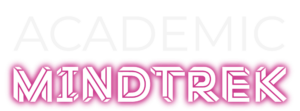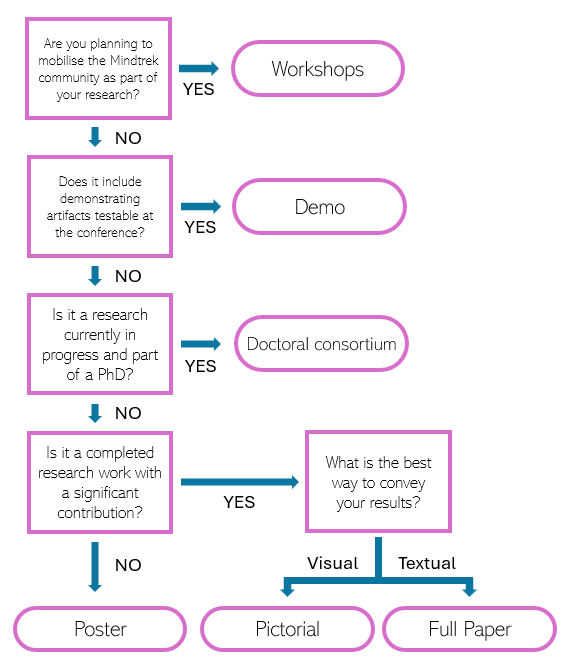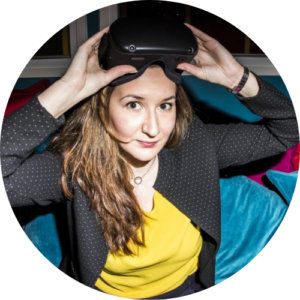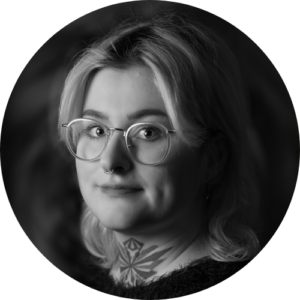Academic Mindtrek 2025

The Countdown Is On
About Academic Mindtrek
The International Academic Mindtrek has been a long-standing exciting meeting place where researchers, experts and thinkers present results from their latest works regarding the development of novel technology, media and digital culture for the society of tomorrow.
When
Tuesday 7th – Friday 10th of
October, 2025 (GMT+3)
Where
Paidia Living Lab of Play (Nokia Arena) | ONLINE
Academic Mindtrek 2025 – Call for Papers and Submission Types
We are very pleased to announce that the 28th International Academic Mindtrek conference will take place between the 7th and 10th of October 2025. We are hoping to host a hybrid event in Tampere, Finland – in person, and live-streamed online.
Academic Mindtrek 2025 welcomes full papers, workshops, demonstrations and poster presentations on a variety of topics relating to HCI as well as a Doctoral Consortium. We are also excited to announce that, in an effort to diversify the types of submission to the conference and to recognise different ways of producing knowledge, this year we also welcome Pictorial submissions!
The International Academic Mindtrek has been a long-standing exciting meeting place where researchers, experts and thinkers present results from their latest works regarding the development of novel technology, media and digital culture for the society of tomorrow.
Mindtrek provides a unique platform where individuals from different fields, including companies, startups, academia, and government institutions, come together. This diversity fosters collaboration, enabling the transition of research findings into practical applications for the industry. Mindtrek thus presents an international stage for out-of-the-box research ideas, rooted in practitioners’ expertise.
Academic Mindtrek 2025 welcomes all scientific contributions that present relevant and actual studies of today that may shape the way we interact with the technologies of tomorrow, as well as direct perspectives and interrogations of futures. Our goal is to facilitate meaningful experiences and knowledge sharing on how technology merges into society and what opportunities and hidden threats it brings to it.
The conference is grounded in a strong collaboration between local organizers from Tampere University and international partners. This collaboration merges Human-Computer Interaction (HCI) research and development in individual conference Tracks:
1. Accessibility and Inclusion in the Digital Society
2. The Future of Smart Cities
3. Data for Good
4. Linguistic Horizons
5. Fictional, Speculative and Critical Futures
6. Games and Gamification
7. Metaverse
8. Human-Nature Interaction
9. Robots and AI in Everyday Life
10. Technology in Education
In addition, the General track welcomes submissions that share methodological understanding and practices on how to design, develop, implement and evaluate interactive computing systems and services for human use. The submitted papers should focus on phenomena related to Human-Computer Interaction (HCI): human factors and requirements, usability and ergonomics, privacy, ethics and trustworthiness of technologies as well as the exploration of other factors involved (e.g., sociological and psychological factors).
Reviewing process and proceedings
The Academic Mindtrek conference has a rigorous peer-review process via the EasyChair system. All submissions are peer-reviewed; each paper will be reviewed by three experts in a double-anonymous review. The review process is managed by local track chairs and their international co-chairs and overseen by the conference and academic program chairs. All accepted papers, pictorials, workshops, demonstrations, and posters will be published in the ACM Digital Library under the International Conference Proceedings Series (ICPS).
Please note that ACM has moved to full Open Access model under which Full papers (including pictorials as an alternative to text-based papers) are required to pay the APC fee.
ACM has introduced a new open access publishing model for the International Conference Proceedings Series (ICPS). Authors based at institutions that are not yet part of the ACM Open program will be required to pay an article processing charge (APC) to publish their ICPS article in the ACM Digital Library, unless one of their co-authors’ institutions is a member or they qualify for a waiver. To determine whether or not an APC will be applicable to your article, please follow the detailed guidance here: https://www.acm.org/publications/icps/author-guidance.
For 2025, ACM is subsidizing APC pricing for ICPS as follows:
- The 2025 subsidized APC rate for ICPS papers will be $350.
- For papers where any of the authors is a member of ACM, the APC rate will be $250.
- For ICPS papers whose corresponding author is based in a lower-middle-income country, the APC rate will be $175.
- For ICPS papers whose corresponding author is based in a lower-middle-income country and where any of the authors is a member of ACM, the APC rate will be $125.
- For ICPS papers whose corresponding author is based in a low-income country, no APC is required.
Further information may be found on the ACM website:
- Full details of the new ICPS publishing model: https://www.acm.org/publications/icps/faq
- Full details of the ACM Open program: https://www.acm.org/publications/openaccess
Timeline for Academic Mindtrek 2025
All deadlines are 23:59 AoE
Submission opens on:
April 8th, 2025
Deadline for full papers, pictorials, and workshops submissions:May 2nd, 2025
Extended to: May 16th, 2025
Notification of acceptance (full papers, pictorials, and workshops):
July 4th, 2025
Deadline for auxiliary submissions (posters, Doctoral Consortium, and demos):
July 31st, 2025
Notification of acceptance (posters, Doctoral Consortium, and demos):
August 11th, 2025
Camera-ready deadline:
August 18th, 2025
CONFERENCE DATES:
7th – 10th October, 2025
Full papers
All submissions will be peer-reviewed and anonymous. Therefore, please remove any information that could give an indication of the authorship. The papers should contain 8-16 pages, excluding the list of references, in ACM single-column format. Mindtrek emphasizes that the length of the submissions should be commensurate with their contribution. Therefore, the authors are encouraged to weigh, particularly for longer papers (more than 12 pages), if their contribution justifies the length of the paper. Papers that do not conform to the page limits (less than 8 pages or more than 16 pages excl. references) might be desk-rejected. At least one author should attend the conference to present the paper if accepted.
Pictorials
Pictorials are an alternative format to Full Paper (text-based) submissions. They offer a visually rich and design-oriented submission format that emphasizes the role of images, illustrations, and graphical elements in presenting research processes and contributions. This format is particularly suited for works that integrate visual communication as a central component of knowledge production and dissemination, such as research in human-computer interaction, design, media studies, and creative technologies. Pictorials leverage visual storytelling in research communication and are particularly suited for practice-based and artistic research or representing data and concepts in a novel way. This format thus emphasises self-sufficient and visual representation that is comprehensible even without the supportive explanatory text. Pictorials are subject to the same peer review process and scientific rigour criteria as Full Papers and are presented at the conference and published under the same category.
Pictorials should follow the template put forward by DIS: https://dis.acm.org/2025/call-for-pictorials/ (under heading Pictorial Formatting). Maximum length is the same as for text-based full papers – 16 pages excl. references.
Workshops
Mindtrek welcomes both hands-on co-design workshops and presentation-based workshops. The purpose of workshops is to involve and mobilise the Mindtrek community in your research effort, either by working together in hands-on approaches, or by collecting different perspectives and opinions through presentations. Workshop proposals should be papers between 4-6 pages long (ACM single-column format) long excluding references. Workshop proposals should also include the organizing committee, a description of the theme and goals of the workshop, a short CV of organizers, duration, and the schedule. At least one author should attend the conference for organizing the workshop during the conference.
In the case of hands-on workshops: in your submission, provide an estimate of how many participants you want to attract. Are you aiming at conference attendees? Would you like to open the workshop to other participants? Please also mention how you will manage the IP of ideas developed in the workshop and if you plan further publications to spin off the workshop.
In the case of presentation-based workshops: in your submission, provide a timeline for submissions and reviews. Workshop submissions will be reviewed by track chairs. Depending on the attached number of papers for each workshop, we provide space for either half-day or full-day workshops. Workshop organizers can create their own proceedings of the accepted position papers (e.g., they can publish submitted papers on their workshop web page).
Posters
Poster submissions are meant to showcase work-in-progress research, or research efforts offering a smaller scientific contribution. Poster proposals should be between 4-6 pages long excluding references in ACM single-column format and a poster should be presented during the conference. Poster submission will be reviewed by track chairs. At least one author should attend the conference to present the poster if accepted.
Demonstration proposals
Interactive experience demonstration proposals are meant to showcase artifacts of solutions that can be tested and interacted with at the conference. Proposals should be papers between 4-6 pages long excluding references. Papers submitted as demonstrations should include:
a) a description and motivation of the interactive experience
b) general architecture of the interactive experience
c) description of the main features of the demonstration
d) the emphasis on novelty when compared to other existing related interactive experiences
e) required materials and the setup to illustrate the demonstration at the conference (e.g. displays, electrical outlets, size of the area, poster board)
f) link to the video of the interactive experience demonstration (required)
g) the type of license (if applicable),
h) the website (if applicable)
i) brief description of the scientific basis behind the interactive experience demonstration (if applicable).
Demonstration proposal will be reviewed by track-chairs. At least one author should attend the conference to present the demonstration if accepted.
Doctoral Consortium
The Doctoral Consortium allows PhD students to present their work in progress doctoral projects and gain feedback and suggestions from experienced mentors. Doctoral Consortium presentation proposals should be papers between 4-6 pages long excluding references. Doctoral Consortium at Mindtrek invites proposals from doctoral students. The Doctoral Consortium is a platform for early-stage doctoral students to present, develop and share ideas. The participants will gain insights from highly acclaimed HCI researchers and feedback on their research work. This forum will also provide visibility and networking platform with fellow researchers.
Selected doctoral consortium entries will be published in the proceedings as short papers.
Please submit the following documents in PDF-format:
- Summary of your doctoral research project including:
1) A brief description of current status of your work;
2) The motivation that drives your dissertation research or what motivated you to begin
3) A summary of the research objectives/goals/questions;
4) Key concepts or terminology that frames your research;
5) Theoretical framework(s) used in the research;
6) Hypothesis/thesis and/or problem statement;
7) Your research approach and methods
8) Results to date;
9) On-going and upcoming work. - Your CV, describing your academic activity and current stage of your doctoral research project.
Submission Format
Please see the following pages regarding the formatting of your publication. Mindtrek adopts the formatting guidelines of ACM. All submissions should be in the single-column format as described in the pages below. Please follow the guidelines carefully as they are integral to the successful publication of your submission and not adhering to the guidelines may make it significantly harder to prepare your submissions for publication if accepted.
https://www.acm.org/publications/authors/submissions
https://authors.acm.org/proceedings/production-information/taps-production-workflow

Call for Chair Volunteers
Academic Mindtrek 2025 is approaching, and we are collecting interest in volunteering for different chairing positions. Currently, we are seeking volunteers from all academic levels for almost all chairing duties.
Academic Mindtrek has a long history; the 28th event will be organised on October 7-10, 2025. Academic Mindtrek 2025 welcomes all scientific contributions that present relevant and actual studies of today that may shape the way we interact with the technologies of tomorrow. Our goal is to facilitate meaningful experiences and knowledge sharing on how technology merges into society and what opportunities and hidden threats it brings to it.
Some chairing positions require physical presence while others may be possible remotely. The selections for the chairing positions will be made according to the requirement of the chairing duties, experience and the availability of the volunteers. For further details, please see the Chair Position Descriptions here.
The form will be open until March 30th, 2025.
MAIN ORGANIZERS

THOMAS OLSSON
Tampere University
General Chair

MILA BUJIĆ
Tampere University
General Chair

VELVET SPORS
University of Tartu
Programme Chair

MATTIA THIBAULT
Tampere University
Programme Chair

TIMO VÄLIHARJU
COSS
Mindtrek Conference Chair

LINDA LEHTO
COSS
Local Arrangement Chair and Conference Management

SUPPORTED BY:
COSS Association, City of Tampere, Tampere University (TAU), Tampere University of Applied Sciences (TAMK), and SIGCHI Finland.